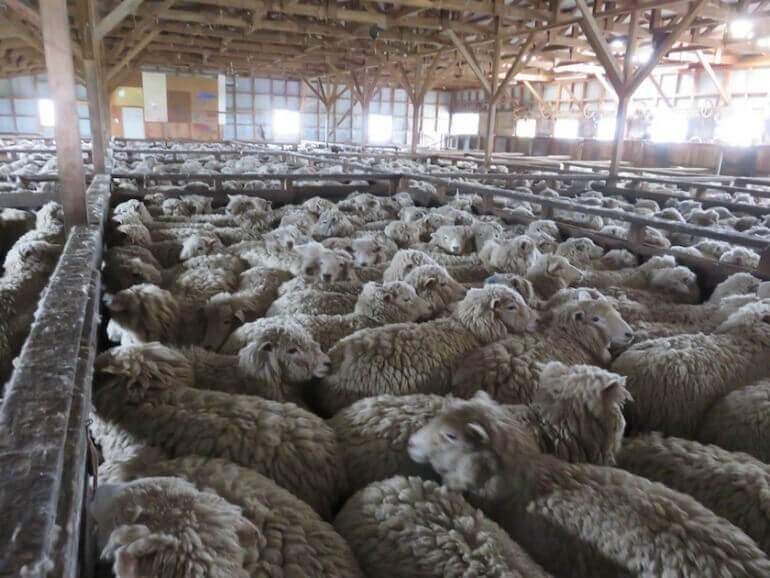In an increasingly conscious world, many consumers seek products that align with their values, leading to a rise in terms like “humane wool” or “ethically sourced.”
But what if these labels are simply a clever marketing tactic, masking a harsh reality for the animals involved?
At Sustainable Action Now, we believe in uncovering the truth behind such claims, and the recent protest outside an Allbirds store in NYC by @itsjamiescorner serves as a powerful reminder: the “humane wool” narrative often hides a cycle of violence and suffering.
The Unseen Reality of Wool Production
When we picture wool, we might imagine sheep peacefully grazing, then gently shorn of their fleece. The reality, however, is often far from idyllic. The global wool industry, driven by profit and volume, frequently subjects sheep to immense stress, fear, and pain, even under certifications that claim to ensure animal welfare.
Shearers are typically paid by the number of sheep they shear, not by the hour. This incentivizes speed over care, leading to rushed, violent handling. Investigations across major wool-producing regions have repeatedly documented shearers punching, kicking, stomping on, and throwing sheep. Animals are often left with gaping wounds from electric clippers, which are then crudely stitched up without any pain relief. Ears, tails, and even teats can be accidentally cut or ripped off in the process.
Beyond the shearing shed, many standard industry practices inflict severe suffering:
- Mulesing: In countries like Australia, where Merino sheep are selectively bred with excessive skin folds to maximize wool production (which also makes them prone to flystrike), lambs endure mulesing. This barbaric procedure involves carving large strips of skin from their hindquarters, often without anesthesia, to create smooth, scarred skin.
- Tail Docking and Castration: Lambs often have their tails cut or burned off, and males are castrated, frequently without any pain relief.
- Neglect and Slaughter: Hundreds of lambs die from exposure or starvation, and mature sheep often succumb to disease or neglect. When their wool production declines, they are typically sent to slaughter, sometimes enduring long, crowded live export voyages to countries with minimal animal welfare standards, where their throats are slit while still conscious.
The “Humane” Lie: Why Labels Can Mislead
The term “humane wool” and certifications like the Responsible Wool Standard (RWS) or ZQ are designed to reassure consumers. However, a closer look reveals significant loopholes and inherent cruelties that these standards often fail to address. For instance, while some certifications prohibit mulesing, many still permit painful procedures like tail docking and castration without mandatory pain relief. The language used can be misleading, with phrases like “a pathway for the application of pain relief” rather than a strict requirement.
The fundamental issue lies in the commodification of sentient beings. When animals are viewed as mere products, their welfare often takes a backseat to efficiency and profit. No matter how many “standards” are put in place, an industry built on exploiting animals for their bodily outputs will inevitably involve practices that cause suffering.
Taking Action: Your Power to Choose
Activists like @itsjamiescorner are on the front lines, exposing these hidden truths and urging brands like Allbirds to move away from wool entirely. Their message is clear: true compassion means choosing alternatives that don’t involve animal exploitation.
As consumers, we hold immense power. By educating ourselves and making informed choices, we can drive demand for truly ethical and sustainable materials. There are countless innovative, animal-friendly alternatives to wool available today, including organic cotton, hemp, Tencel, recycled polyester, and various plant-based and bio-based fibers. These options offer warmth, comfort, and style without contributing to animal suffering.
Let’s look beyond the misleading labels and demand genuine compassion from the industries we support. Every purchase is a vote for the kind of world we want to live in. By choosing animal-free alternatives, we contribute to a future where no animal has to endure the silent suffering that Luna once faced, or the systemic violence inherent in the wool industry.
For more in-depth information on animal abuse and how you can take action, visit our dedicated section on animal welfare: https://sustainableactionnow.org/category/abuse-of-animals-wildlife/


